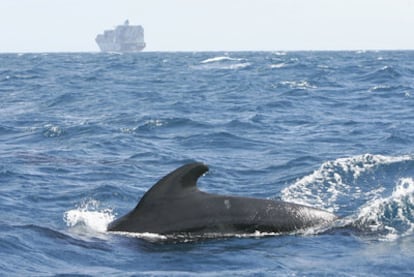Freighter route threatens largest cetacean population in Mediterranean
"Unnecessary" thoroughfare cannot be halted; four confirmed collisions in Strait
A new ferry route between Tarifa and a newly built port in Tangier, Morocco, is a direct threat to the largest concentration of cetaceans in the Mediterranean, Greenpeace and a leading expert in the field have warned.
The maritime passage, which is set to open to freighters, cuts a swath through an area of the Strait of Gibraltar frequented by sperm whales, orcas, pilot whales and dolphins. In a letter to the environmental organization, the Merchant Marine department of the Public Works Ministry admitted it does not "consider the said route to be necessary" but cannot prohibit its use.
Instead, the Ministry has requested that freighters reduce their speeds in the area to 13 knots - they are capable of reaching 40 knots - and employ observers on deck in an attempt to avoid collisions with whales and dolphins.
"There is an exclusion zone that is ignored already; this will split it in two"
Until now, co-habitation had been difficult - the Strait of Gibraltar is one of the world's busiest maritime thoroughfares - but now crunch time has been reached: in 2007 Spain issued "a notification to seafarers" to reduce the speed of their boats in the area around Tangier, where 25 sperm whales make their seasonal home.
But this island of cetacean repose is likely to be overrun. Morocco recently inaugurated its colossal Tanger-Med port, with the priority of reeling in all the freighters bound for the North African coast from Spain, according to sources at the Algeciras Port Authority, which also manages Tarifa harbor. All Morocco-bound shipping from Spain, except that sailing from Tarifa, already docks at the new port.
The construction of the Tanger-Med facility constitutes a major bid by Morocco to compete with Algeciras as a container port - it is the largest in the Mediterranean and Africa - while leaving the old installations in Tangier for use by cruise ships and fishing vessels.
Greenpeace has blasted the creation of the new route: "There is an exclusion zone that is ignored already and now they are going to create a new route that slices it in two. These freighters travel very fast and they are not going to reduce their speeds," says Pilar Marcos, the head of the organization's coastal campaign.
The Merchant Marine department has distanced itself from the new route. In a letter to Greenpeace the department expressed its intent to hold a meeting with the freighter companies and proposes ships carry "detectors to avoid collisions with cetaceans," in addition to requesting a top speed of 13 knots in the area.
Marcos points out that the Tanger-Med port has yet to be the subject of an Environmental Impact Assessment.
"They are planning a route without waiting for the impact assessment on the port. Spain cannot argue that it has nothing to say in the matter."
Renaud de Stephanis, president of the Center for Conservation, Information & Research on Cetaceans (Circe), says there have been four documented collisions in the Strait. "In 2002 we saw one close up. A freighter passed by our side and ran into a sperm whale, which was left expelling jets of blood."
Circe's assessment states that the new route could cause a "significant increase in the number of collisions between fast ferries and these species." However, the study center also believes that on-deck observers, a reduction in speed and the provision of a website that monitors the location of sperm whales and other cetaceans will be sufficient to reduce collisions in the Strait.

Tu suscripción se está usando en otro dispositivo
¿Quieres añadir otro usuario a tu suscripción?
Si continúas leyendo en este dispositivo, no se podrá leer en el otro.
FlechaTu suscripción se está usando en otro dispositivo y solo puedes acceder a EL PAÍS desde un dispositivo a la vez.
Si quieres compartir tu cuenta, cambia tu suscripción a la modalidad Premium, así podrás añadir otro usuario. Cada uno accederá con su propia cuenta de email, lo que os permitirá personalizar vuestra experiencia en EL PAÍS.
¿Tienes una suscripción de empresa? Accede aquí para contratar más cuentas.
En el caso de no saber quién está usando tu cuenta, te recomendamos cambiar tu contraseña aquí.
Si decides continuar compartiendo tu cuenta, este mensaje se mostrará en tu dispositivo y en el de la otra persona que está usando tu cuenta de forma indefinida, afectando a tu experiencia de lectura. Puedes consultar aquí los términos y condiciones de la suscripción digital.








































